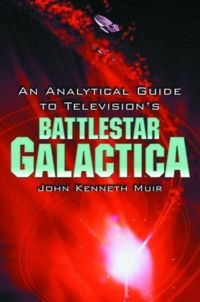An Analytical Guide to Television's Battlestar Galactica
More actions

| ||
| An Analytical Guide to Television's Battlestar Galactica A book of the McFarland & Company line | ||
|---|---|---|
| Book No. | 1 | |
| Author(s) | John Kenneth Muir | |
| Adaptation of | ||
| No. of Pages | {{{pages}}} | |
| Published | October 31, 2005 | |
| ISBN | 0786424559 | |
| Chronology | ||
| Previous | Next | |
| none | An Analytical Guide to Television's Battlestar Galactica | none |
| Paperback Version | ||
| Available at Amazon.com – Purchase | ||
| Available at Amazon.co.uk – Purchase | ||
| Audiobook Version | ||
| Available at iTunes – [{{{itunes}}} Purchase] | ||
An Analytical Guide to Television's Battlestar Galactica (McFarland & Company, October 2005, ISBN 0786424559), by John Kenneth Muir.
Publisher Description
When the space drama Battlestar Galactica debuted on ABC in 1978, it was expected to be the most popular new program of the year. Instead, it was attacked as a Star Wars rip-off and canceled after a mere 17 stories. The author acknowledges the show was full of dramatic clichés and scientific inaccuracies, but despite these shortcomings, Battlestar Galactica was a dramatically resonant series full of unique and individual characters, such as Commander Adama (Lorne Greene) and ace warrior Captain Apollo (Richard Hatch).
The author contends that Battlestar Galactica was a memorable attempt to make science fiction accessible to mainstream television audiences. The brilliant work of artist John Dykstra brought a new world of special effects to network television. Battlestar Galactica also skillfully exploited legends and names from both the Bible and ancient mythology, which added a layer of depth and maturity to the weekly drama.
Notes
- This book angered many Galactica fans due to Muir's assertion that Adama's military rule of the fleet was fascism.
- There is an in-depth episode guide for both Battlestar Galactica and Galactica 1980.
- Muir makes comparisons to other sci-fi shows such as Buck Rogers, Space: 1999, Star Trek, and Space: Above and Beyond.
- Despite some factual errors, the book is well-researched overall. There is great detail given to the filmography of the various guest-stars that appeared on the series.
- Muir argues that the crashed ship in War of the Gods was in fact the Battlestar Pegasus, despite the original script for the episode saying otherwise.
- There is a chapter that lists every episode of Buck Rogers that uses Galactica stock footage.
